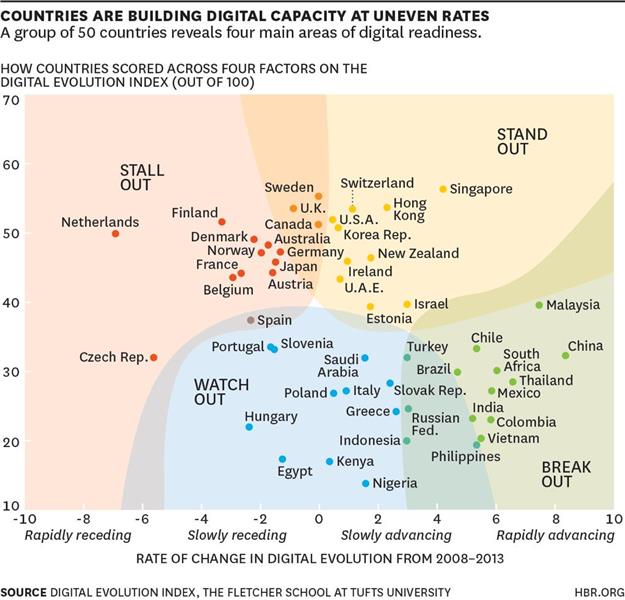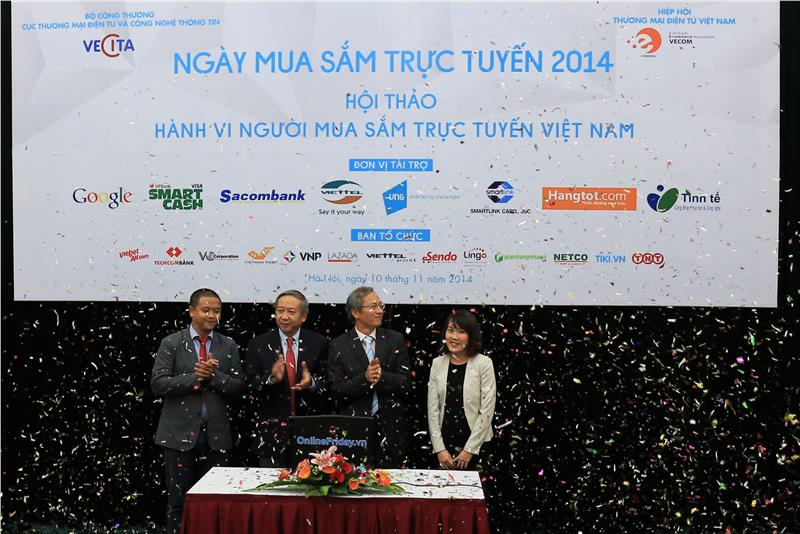To better understand the changes in digital business of each country from all over the world, an index was created to classify countries into different categories according to its level of development towards the digital economy. This index is called Digital Evolution Index (DEI), which was created by Fletcher School of Law and Diplomacy - Tufts University basing on 4 elements including supply source (accessibility, responsiveness, and infrastructure for conducting transaction); quantity demanded (consumer behaviors and trends, knowledge about finance - Internet - social media); breakthrough capabilities (environmental loans, technology, entrepreneurship, the presence and extent of breakthrough factors and entrepreneurship culture); and organization (effectiveness of government policies, legal systems - regulations, ability to promote the digital ecosystem). 50 countries were ranked depending on two criteria, which are the largest number of Internet users comparing to the total of 3 billion users in the world and the country which is believed as home of next one billion users. The objective of the study is to find out which country having the fastest changes to proceed to the digital economy. According to survey results, developing countries in Asia (including Vietnam) and Latin America occupy the highest positions.

Based on activities in a period of 2008 - 2013, the research team of Fletcher School of Law and Diplomacy classified 50 countries in 4 groups involving Stand Out, Stall Out, Break Out, and Watch Out. Stand Out Group consists of countries having the high level for developing digital in the past and continuing the upward trend. Stall Out Group includes nations having the high level of digital development in the past but gradually falling behind. Break Out is a group of countries having great potentials in developing the strong digital economy. In spite of having low overall score, these countries are gradually going up and will become members of Stand Out Group in the future. Finally, Watch Out Group are nations having facing challenges in the development of the digital economy. These countries gain low point for both speed and level. Nonetheless, they still have good opportunities to promote the digital business. Some of them can make a breakthrough with effective measures.

From the survey, Break Out Group includes India, China, Brazil, Vietnam, and Philippines. These countries are significant growing in terms of digital. Nonetheless, it is forecasted that the next development stage is more difficult to complete. Remaining this speed means that the countries will have to solve many challenges such as improving the infrastructure or attracting smart consumers. Meanwhile, Watch Out Group includes Indonesia, Russia, Nigeria, Egypt and Kenya. The common features of this group are institutional instability and low possibility of reforming. They have one or two elements to attract investment, in which the most outstanding one is the population. If removing the problems of institutional instability and low possibility of reforming and taking advantage of population, these countries will make use of resources efficiently. Almost Western countries, Australia, and Japan belongs to Stall Out Group. The only way to make a lead is follow the way of Stand Out countries, try to make double breakthrough, and seek international markets. In the future, it is expected that consumers will purchase goods by mobile devices. International influence will become more and more increasing. All are moving towards the digital planet with different speeds.
